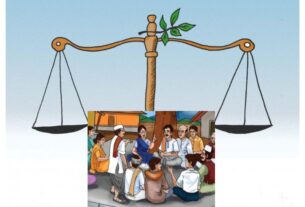Bahutva Karanataka, a Karnataka-based NGO released it’s fourth report on the central government’s treatment of federalism.
In an online press conference speakers affiliated with Bahutva Karnataka (BK) alleged that Indian federalism has been endangered the most in the past five years than it has been in the history of India. The speakers alleged that the central government had been severely eroding the autonomy of the federal states in India on economic, cultural and political and linguistic lines. Their main contentions were with the central government’s ‘One nation’ political programs, consistent denial or delay of timely and proper financial aid and drought relief and the emergence of a confrontational governor who was ‘undermining the federation of India’.
Held today, Bahutva Karnataka released its fourth report investigating the guarantees of federalism by the ruling National Democratic Alliance (NDA). The panel, hosted by Vinay K.S., an advocate affiliated with the organisation, had three speakers: Janaki Nair, a historian and a member of BK; Clifton D’souza, an advocate and the national general secretary of the All India Lawyer’s Association for Justice and Venkat Sreenivasan, an economist and a member of Eddelu Karnataka.
They also expressed concern on the growing role of Hindu Nationalism and the alleged imposition of Hindi on other states at the detriment of the local language and the state’s linguistic identity. Janaki Nair alleged that the central government was ignoring the necessity to respect the linguistic independence of a state by drawing attention to the instance where Amit Shah, Minister of Home Affairs inaugurated a CRPF Rapid Action Force unit in Bhadravathi, Karnataka, where the foundation stone plaque only had information in Hindi and English but not in Kannada. Vinay also highlighted the decision in 2022 to hold the combined graduate level exam conducted by the Staff Selection Commission only in English and Hindi.
“This pattern of behaviour is not new to India, Indira Gandhi’s regime had also engaged in the same but in the last five years, the threat to federalism has increased to unprecedented levels we have not seen before,” said Janaki Nair, who also co-wrote the report.
The panel also discussed the discrimination of states based on financial aid and the central government’s attitude towards rising income inequality. Economist Venkat Sreenivasan criticized the appointment of Arvind Panagariya as the chair person of the finance and drew attention to the fact that he had written a piece called ‘Don’t lose sleep over inequality’ for the Times Of India where he tried to make the case that India’s wealth and income inequality was not as serious as alleged.
He further stated that the central government engages in unfair allocation of funds using outdated and improper means.
“The state allocates funds based on a state’s control of its fertility rate and its tax efficiency. Despite the fact that states like Karnataka and Kerala have higher share of lower fertility, the central government calculates the amount of resources to be allotted by multiplying the population of states in 1971 with the total fertility ratewhich is a ridiculous way to prevent states that did well from obtaining their fair share of funds,” Sreenivasan said.
Sreenivasan further said that states like Karnataka that are not in favour of the central government’s ruling party have a harder time accessing financial aid for drought relief and for schemes like Mahatma Gandhi National Rural Employment Guarantee Act (MGNREGA).
The panel also expressed concerns for the impact on democracy that this neglect of the spirit of ‘cooperative federalism’ through the central government’s ‘One Nation’ schemes that would centralize citizen’s access to ration cards, registration and voting in elections.
“These policies are quite literally the death knell of federalism and democracy and it paves the way for a single party hegemony with disastrous implications for regional parties and an obliteration of regional contexts under which crucial administrative decisions are made,” advocate Clifton D’souza said.
They concluded the panel by sharing their concerns on the impending delimitation exercise.
“States that have limited their populations will lose seats in parliament, while those who have not will obtain more seats,” D’souza said.
The report also contains a list of deaths due to the central government’s alleged ‘anti-federalist’ practices where an estimated 2,000 people have died in the last ten years.
“The ruling party operates with the mechanism of threats and incentives, it threatens those voters whose states are not ruled by their party and incentivizes voters whose states elect them, there needs to be a political movement beyond academic circles, we need to fight and convert this into a matter for the people,” said Sreenivasan.




